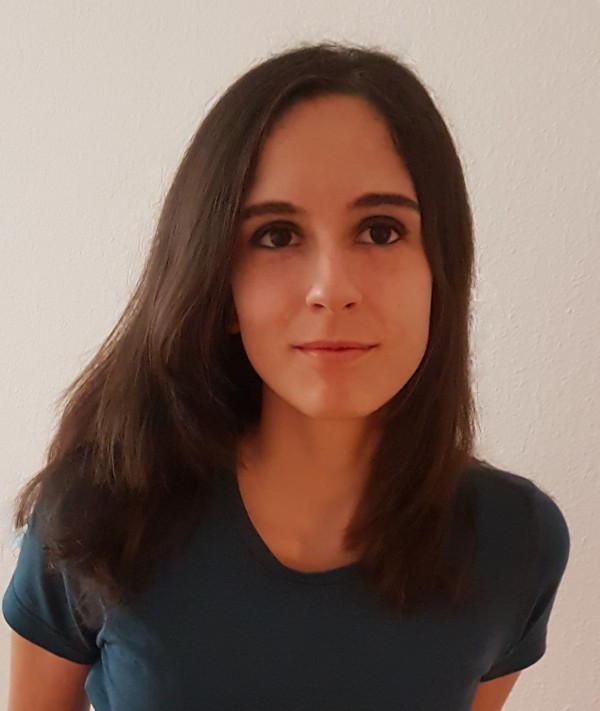Dr. Miriam Filippi

Dr. Miriam Filippi
Lecturer at the Department of Mechanical and Process Engineering
Additional information
Research area
Soft robotics can be greatly advanced by unique features found in living systems (self-healing, softness, biocompatibility, energy conversion efficiency, degradability).
My aim is to find manufacturing and biological strategies to make living systems become effective engineering materials. Engineered muscle tissue is an extraordinary multifunctional platform that is capable of controllable deformation (ie, bio-actuation), and serves for robotic and biomedical applications. My work focuses on generating 3D muscle tissue-constructs, integrating them with artificial elements and technologies, and using them as biomodules for actuation, sensing, and signal communication in bio-hybrid robots.
Key Active Projects:
- Integrative designs for neuromuscular tissue models. This project looks at combining biological actuators cells (skeletal muscle) with their natural controllers (motoneurons) and studing the bio-electronics behind signal transmission in 3D models. Here, we aim to solve design problems (e.g., fine distribution of neural cells and cm-scaled designs), and understand the applicability to biomedical applications of system realized from medically relevant cells (e.g., iPSCs-derived motoneurons).
- Sustainability in biofabrication. This project aims at reducing resource and time that are needed to fabricate engineered muscle tissue models. We look into computed modeling approaches to select optimized muscle designs and raw materials that match defined bio-actuation metrics, thus allowing us to refine the process of biofabrication.
- Autonomous operation in muscle-based bio-actuators. This project focuses on integrating novel functions into bio-actuators that enable automaticity in their operation. To integrate novel functions in our engineered muscles, we look into responsive, functional materials that can be prepared as soft formulations and seamlessly integrated with cell-loading hydrogels that forms the engineered muscle in vitro. Sensorized muscle for closed-loop control of bio-actuation
- High-performance, durable engineered muscle tissue. This project focuses on achieving higher force output and improving actuation performance of 3D bio-actuator designs by increasing the size of engineered skeletal muscle tissue and enabling its full maturity. We look into high-resolution biofabrication and microfluidics to understand how to realize intratissular perfusable architectures for sufficient nutrient and gaseous exchange for the cells to survive, and enable the scaling up of engineered tissue beyond the cm-scale. Bioprinting of cm-scale perfusable muscle
- Musculoskeletal designs for bio-hybrid robots. Biohybrid actuators that use living muscle tissue hold promise for replicating natural motion in biomedical and robotic systems. A major challenge lies in poor force output and transfer at the muscle–tissue interface. Inspired by the native myotendinous junction, we aim at engineering a 3D-bioprinted muscle–tendon unit using fibroblast-loaded tendon-like anchors. We use computational modeling to guide the design to enhance force generation and stability. This project emphasizes the value of architectural biomimicry and mechanical tuning for force preservation.
- Homeostatic bio-actuators for real-world use. Artificial tissue constructs typically require incubators to maintain temperature and nutrient supply, limiting their use outside labs. To create the bio-actuators that can work outside the lab environment, we are developing on autonomous control systems for the vital tissue parameters (e.g., temperature and nutrition).
Profile: Bioengineer with a neurobiological background and expertise in Tissue Engineering, Regenerative Medicine, Molecular Imaging, Bio-hybrid Systems, and Nanotechnology.
Previous and current research areas: regeneration and tissue engineering in skeletal/cardiac muscle tissue, neuromuscular tissue, spinal cord, nerve, bone, tendon, and cartilage tissue.
Focus: engineering of complex tissue models (e.g., biomimetic architectures, vascularization/perfusion strategies, heterocellular cultures, multi-tissue models, and bio-hybrid interfaces); developmental tissue engineering; biophysical principles (e.g., magnetic actuation; photothermal bioelectrical nanomodulation, magneto-sonoporation, optogenetics) for remote modulation of cell functions (e.g., stem cell differentiation, muscle cell contraction, membrane depolarization); molecular imaging probes for cancer and injury detection (e.g., hypoxia-sensitive probes, theranostic approaches); cell therpay and in vivo surveillance of transplanted regenerative cells.
Professional experience
2022-current: Established Researcher in Growing, Fabricating and Controlling of Biohybrid Robot. Soft Robotics Laboratory, ETH Zurich, Switzerland.
Lecturer (Master Courses: "Distinguished Lecture Series on Engineering with Living Materials", MaP ETH; "Cells and Technologies in Regenerative Surgery" UniBasel)
Biosafety Officer (Level I and II), Biolab Manager, Sustainibility Officer.
Scientific coordinator of: "3D Bioprinting of Muscle-Tendon Units" (ETHZ - IBEC); "Bioxolography and machine learning to engineer skeletal muscle tissue for actuation" (ETHZ - UniBasel - EOC - Humboldt Uni); "Biofabrication of Neuromuscular Tissue Models" (ETHZ); "Multiscale Biohybrid Tissues for Robotics Driven by Applications in Health" (ETHZ - ALIVE); "Hydrogel-based Strategies for Selective Actuation Control in Engineered Skeletal Muscle" (ETHZ - EPFL); "Sensorized Bio-actuators for Autonomous Bio-robotics" (ETHZ - EMPA); "Perfusion Strategies for Scalable Engineered Tissue" (ETHZ).
2021-2022: Post-Doc Researcher in Growing, Fabricating and Controlling of Biohybrid Robot. Soft Robotics Laboratory, ETH Zurich, Switzerland.
2017-2020: Post-Doc Researcher in Nanomaterials for Tissue Engineering and Regenerative Medicine. Laboratory of Tissue Engineering, University Hospital of Basel, Switzerland.
2013-2016: PhD in Pharmaceutical and Biomolecular Sciences. Molecular Imaging Centre, University of Turin, Italy.
2014-2015: Teaching assistant in General and Inorganic Chemistry. Faculty of Pharmacy, University of Turin, Italy.
2012: Scientific Associate in Molecular Imaging. Molecular Imaging Centre, University of Turin, Italy.
2010-2012: M.Sc. in Molecular Biotechnology and Imaging, University of Turin, Italy.
2011-2012: Teaching assistant in Molecular Tumor Immunology. Laboratory of Tumor Immunology, University of Turin, Italy.
2010-2012: Scientific trainee in Molecular Tumor Immunology. Laboratory of Tumor Immunology, University of Turin, Italy.
2006-2010: B.Sc. in Molecular Biotechnology, University of Turin, Italy.
Honours
| Year | Distinction |
|---|---|
| 2025 | Micromachines Young Investigator Award |
| 2024 | Wittenstein Biointelligence Award for Individuals |